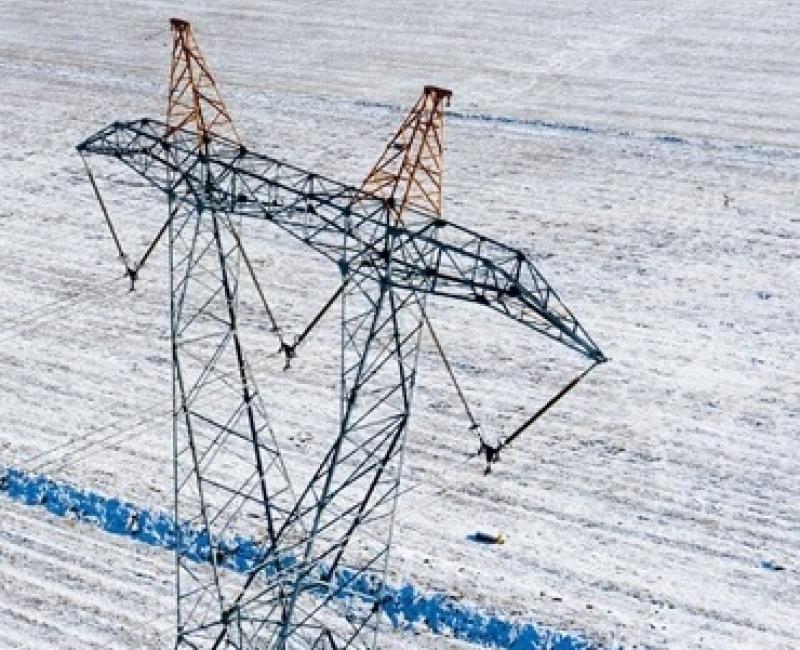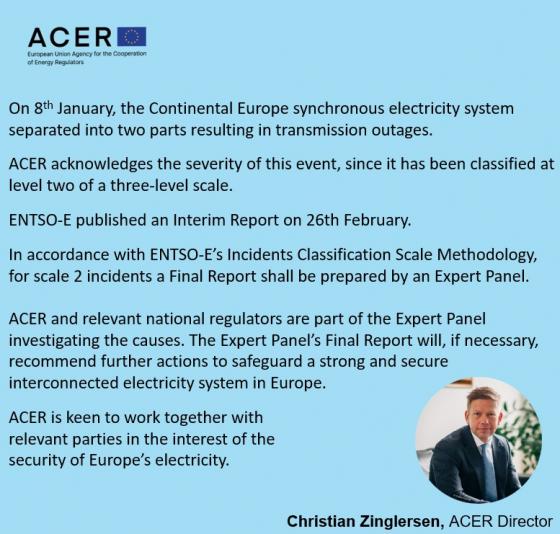01.10.2025 - ACER/2025/LVP/0055-EXA: Study on balancing market design for the European Union Agency for the Cooperation of Energy Regulators
Estimated budget: EUR 60,000
Approx. launch date: End October 2025
Deadline to register an interest: 15.10.2025
11.09.2025 - ACER/2025/MVP/0053-EXA: Consultancy services to carry out a data request and validation for the gas Transmission System Operators (TSOs) efficiency benchmark of the European Union Agency for the Cooperation of Energy Regulators
Estimated budget: EUR 140,000
Approx. launch date: October 2025
Deadline to register an interest: 26.09.2025
ACER/2025/MVP/0004-EXA: Study on the reference techno-economic investment parameters for assessing future capacities in the European power system for the European Union Agency for the Cooperation of Energy Regulators
Estimated budget: EUR 120,000
Approx. launch date: mid February 2025
Deadline to register an interest: 05.02.2025
ACER/2024/MVP/0027-EXA: Estimation of efforts for the implementation of the software for the market-based allocation of cross-zonal capacity in the EU electricity balancing markets for the European Union Agency for the Cooperation of Energy Regulators
Estimated budget: EUR 20,000
Approx. launch date: end October 2024
Deadline to register an interest: 22.10.2024
ACER/2024/MVP/0036-EXA: Consultancy services to design the methodology and process for carrying out a GAS TSO efficiency benchmark for EU TSOs for the European Union Agency for the Cooperation of Energy Regulators
Estimated budget: EUR 121,000
Approx. launch date: November 2024
Deadline to register an interest: 08.11.2024
ACER/2024/MVP/0026-EXA: Study to support the development of scenarios for EU-wide infrastructure planning and adequacy assessments for the European Union Agency for the Cooperation of Energy Regulators
Estimated budget: EUR 120,000
Approx. launch date: end September 2024
Deadline to register an interest: 24.09.2024
ACER/2024/MVP/0025-EXA: Senior management retreats and executive coaching for the European Union Agency for the Cooperation of Energy Regulators
Estimated budget: EUR 60,000
Approx. launch date: mid September 2024
Deadline to register an interest: 06.09.2024
ACER/2024/MVP/0023-EXA: Supplies for electrical, structural wiring and security installation and associated maintenance and repair services for the European Union Agency for the Cooperation of Energy Regulators
Estimated budget: EUR 126,000
Approx. launch date: mid August 2024
Deadline to register an interest: 10.08.2024
ACER/2024/MVP/0019-EXA: Consultancy services to design the methodology and process for carrying out a GAS TSO efficiency benchmark for EU TSOs for the European Union Agency for the Cooperation of Energy Regulators
Estimated budget: EUR 106,000
Approx. launch date: end August 2024
Deadline to register an interest: 31.07.2024
ACER/2024/LVP/0015-EXA: Study on the harmonisation of the imbalance settlement for the European Union Agency for the Cooperation of Energy Regulators
Estimated budget: EUR 60,000
Approx. launch date: end July 2024
Deadline to register an interest: 22.07.2024
ACER/2024/MVP/0002: Provision of data visualisation services for the European Union Agency for the Cooperation of Energy Regulators
Estimated budget: EUR 142,999
Approx. launch date: beginning of March 2024
Deadline to register an interest: 06.03.2024
ACER/NEG/IGR/36/2023: A study on unlocking the full potential of the electricity system of systems for the European Union Agency for the Cooperation of Energy Regulators
Estimated budget: EUR 75,000
Approx. launch date: beginning of November 2023
Deadline to register an interest: 03.11.2023
ACER/NEG/CS/34/2023: Provision of Internet connectivity services for the European Union Agency for the Cooperation of Energy Regulators
Estimated budget: EUR 140,000
Approx. launch date: beginning of November 2023
Deadline to register an interest: 27.10.2023
ACER/NEG/SDC/33/2023: Provision of online media monitoring services for the European Union Agency for the Cooperation of Energy Regulators
Estimated budget: EUR 60,000
Approx. launch date: End of October 2023
Deadline to register an interest: 16.10.2023
ACER/NEG/CS/29/2023: Provision of transport services for the European Union Agency for the Cooperation of Energy Regulators (LOT 1: Carried out by an executive limousine and/or a passenger van, LOT 2: Carried out by a mini-bus and/or a bus)
Estimated budget: EUR 92,000
Approx. launch date: end August 2023
Deadline to register an interest: 29.08.2023
ACER/NEG/CS/24/2023: Maintenance of technical equipment in the Data Centre of the European Union Agency for the Cooperation of Energy Regulators
Estimated budget: EUR 140,000
Approx. launch date: August 2023
Deadline to register an interest: 24.08.2023
ACER/NEG/CS/22/2023: Provision of removal services and rental of storage facilities for the European Union Agency for the Cooperation of Energy Regulators (LOT 1: Provision of removal services; LOT 2: Rental of storage facilities)
Estimated budget: EUR 140,000
Approx. launch date: beginning July 2023
Deadline to register an interest: 29.06.2023
ACER/NEG/IGR/21/2023: Study on the implementation, availability and uptake of dynamic price contracts in EU Member States
Estimated budget: EUR 50,000
Approx. launch date: July 2023
Deadline to register an interest: 17.07.2023
ACER/NEG/SDC/06/2023: Provision of catering services for the European Union Agency for the Cooperation of Energy Regulators
Estimated budget: EUR 60,000
Approx. launch date: end of June 2023
Deadline to register an interest: 20.06.2023
ACER/NEG/CS/07/2023: Learning and development services for general skills development and training on energy policy for the European Union Agency for the Cooperation of Energy Regulators (Lot 1: Training in general skills, soft skills and management skills, Lot 2: Training in European energy policy, energy regulation and energy legislation)
Estimated budget: EUR 120,000
Approx. launch date: end May 2023
Deadline to register an interest: 22.05.2023
ACER/NEG/MIT/12/2023: Provision of hosting and co-location services for the European Union Agency for the Cooperation of Energy Regulators
Estimated budget: EUR 140,000
Approx. launch date: end May 2023
Deadline to register an interest: 24.05.2023
ACER/NEG/CS/13/2023: Provision of transport services for the European Union Agency for the Cooperation of Energy Regulators (LOT 1: Carried out by executive limousine and/or passenger van, LOT 2: Carried out by mini-bus and/or bus)
Estimated budget: EUR 92,000
Approx. launch date: June 2023
Deadline to register an interest: 23.05.2023
ACER/NEG/IGR/10/2023: Establishing criteria for benefit-based remuneration of efficient infrastructure investments for the European Union Agency for the Cooperation of Energy Regulators
Estimated budget: EUR 75,000
Approx. launch date: end March 2023
Deadline to register an interest: 24.03.2023
ACER/NEG/ED/04/2023: Review of Member States’ practices regarding the methodology for calculating the value of lost load, the cost of new entry and the reliability standard
Estimated budget: EUR 80,000
Approx. launch date: April 2023
Deadline to register an interest: 14.04.2023
ACER/NEG/IGR/08/2023: Study on the impact of the measures included in the EU and national gas storage regulations for the European Union Agency for the Cooperation of Energy Regulators
Estimated budget: EUR 50,000
Approx. launch date: March 2023
Deadline to register an interest: 20.03.2023
ACER/NEG/SDC/05/2023: Provision of design services for the EU Agency for the Cooperation of Energy Regulators
Estimated budget: EUR 60,000
Approx. launch date: March 2023
Deadline to register an interest: 06.03.2023
ACER/NEG/ED/03/2023: Study on the welfare potential of co-optimised allocation of cross-zonal capacity between the balancing capacity and day-ahead electricity markets for the European Union Agency for the Cooperation of Energy Regulators
Estimated budget: EUR 60,000
Approx. launch date: March 2023
Deadline to register an interest: 06.02.2023
ACER/NEG/IGR/02/2023: Establishing criteria for benefit-based remuneration of efficient infrastructure investments for the European Union Agency for the Cooperation of Energy Regulators
Estimated budget: EUR 50,000
Approx. launch date: first half of February 2023
Deadline to register an interest: 25.01.2023
ACER/NEG/IGR/29/2022: Provision of analysis and data outlining the impact of the energy crisis on European electricity and gas consumers and the impacts of the policy measures implemented in relation to the crisis for the European Union Agency for the Cooperation of Energy Regulators
Estimated budget: EUR 20,000
Approx. launch date: mid-November 2022
Deadline to register an interest: 03.11.2022
ACER/NEG/ED/20/2022: Study on technical and legal definitions of congestions in electricity networks for the European Union Agency for the Cooperation of Energy Regulators
Estimated budget: EUR 60,000
Approx. launch date: September 2022
Deadline to register an interest: 25.08.2022
ACER/NEG/MIT/19/2022: Supply and installation of an upgraded cooling capacity in the Data Centre of the European Union Agency for the Cooperation of Energy Regulators
Estimated budget: EUR 45,000
Approx. launch date: July 2022
Deadline to register an interest: 08.07.2022
ACER/NEG/IGR/15/2022: A study on requirements and implementation of ENTSOG Cost Benefit Analysis methodology for Hydrogen Infrastructure for the European Union Agency for the Cooperation of Energy Regulators
Estimated budget: EUR 80,000
Approx. launch date: End of June 2022
Deadline to register an interest: 16.06.2022
ACER/NEG/IGR/12/2022: A report on Unit Investment Cost Indicators for Electricity and Gas Infrastructure Projects
Estimated budget: EUR 75,000
Approx. launch date: April 2022
Deadline to register an interest: 13.04.2022
ACER/NEG/LS/07/2022: Provision of general legal support in Slovenian law for the European Union Agency for the Cooperation of Energy Regulators
Estimated budget: EUR 60,000
Approx. launch date: End of March 2022
Deadline to register an interest: 18.03.2022
ACER/NEG/MIT/25/2021: Disaster recovery site for REMIT information systems for the European Union Agency for the Cooperation of Energy Regulators
Estimated budget: EUR 60,000
Approx. launch date: second half of October 2021
Deadline to register an interest: 18.10.2021
ACER/NEG/SDC/19/2021: Provision of infographics and data visualisation services for the European Union Agency for the Cooperation of Energy Regulators
Estimated budget: EUR 60,000
Approx. launch date: August 2021
Deadline to register an interest: 30.07.2021
ACER/NEG/CS/18/2021: Provision of fitting out works at the premises of the European Union Agency for the Cooperation of Energy Regulators (LOT 1: Renovation and upgrade of bathroom facilities, LOT 2: Fitting out and upgrade of the lighting system)
Estimated budget: EUR 90,000
Approx. launch date: August 2021
Deadline to register an interest: 27.07.2021
ACER/NEG/CS/16/2021: Provision of removal services and rental of storage facilities for the European Union Agency for the Cooperation of Energy Regulators
Estimated budget: EUR 25,000
Approx. launch date: mid July 2021
Deadline to register an interest: 02.07.2021
ACER/NEG/CS/13/2021: Provision of office stationery and office supplies for the European Union Agency for the Cooperation of Energy Regulators
Estimated budget: EUR 80,000
Approx. launch date: Mid June 2021
Deadline to register an interest: 04.06.2021
ACER/NEG/LS/04/2021: Provision of legal advice services for the staff of the European Union Agency for the Cooperation of Energy Regulators
Estimated budget: EUR 60,000
Approx. launch date: End February 2021
Deadline to register an interest: 12.02.2021
ACER/NEG/ED/24/2020: Study on application of clustering algorithms on nodal simulation results to identify alternative bidding zone configurations related to electricity
Estimated budget: EUR 80,000
Approx. launch date: End November 2020
Deadline to register an interest: 26.11.2020
ACER/NEG/CS/17/2020: Maintenance of technical equipment in the Data Centre of the European Union Agency for the Cooperation of Energy Regulators
Estimated budget: EUR 100,000
Approx. launch date: mid October 2020
Deadline to register an interest: 13.10.2020
ACER/NEG/DO/12/2019: Provision of online media monitoring services and weekly press/media digest/summary for the European Union Agency for the Cooperation of Energy Regulators
Estimated budget: EUR 60,000
Approx. launch date: mid October 2019
Deadline to register an interest: 11.10.2019
ACER/NEG/ADMIN/08/2019: Provision of postal services for the Agency for the Cooperation of Energy Regulators
Estimated budget: EUR 80,000
Approx. launch date: end of May 2019
Deadline to register an interest: 21.05.2019
ACER/NEG/DO/09/2019: Provision of catering services for the Agency for the Cooperation of Energy Regulators
Estimated budget: EUR 144,000
Approx. launch date: end of May 2019
Deadline to register an interest: 21.05.2019
ACER/NEG/ADMIN/04/2019: Provision of transport services for the Agency for the Cooperation of Energy Regulators
Estimated budget: EUR 60,000
Approx. launch date: March 2019
Deadline to register an interest: 05.03.2019





